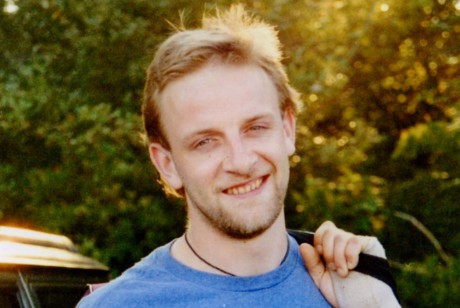
TRAGIC… Niall Leonard
NIALL Leonard, Lisnaskea, was a 37 year old remand prisoner in Maghaberry when he died by suicide in his cell on 7th July, 2012.
Following his death, the Prisoner Ombudsman’s Office investigated the circumstances and events surrounding Niall’s death, and, also, the care provided to him whilst in prison.
Mr Leonard had been suffering from post traumatic stress disorder (PTSD) since shortly after he was kidnapped and tortured by paramilitaries when he was 17 years old.
According to the Ombudsman’s report, he had attempted suicide twice before his last remand.
The Ombudsman noted his medical history.
Yet, up until this last episode, Mr Leonard had been successfully studying law, he was in his third year and was highly regarded by his lecturers and well-liked by his peer group.
The Ombudsman Report quotes one prison officer who stated, “you could not help but like him”.
That being so, there are questions that Niall’s mother wants answers to.
Professor Mike Tomlinson of Queen’s University, Belfast, the author of, “The Trouble With Suicide”, suggests that the highest and most rapidly increasing suicide rates are among men from 35 to 44 (Niall was 37) who, as children, grew up amid division and conflict.
Suicide prevention is ineffective, he explained, unless the relevance of the conflict is acknowledged and understood so that individuals at risk, like Niall Leonard, are identified and helped.
While Niall’s mother, Rita, welcomes many of the findings and recommendations in the Ombudsman’s report, she strongly disagrees with his conclusion that Niall’s decision to take his life, “could not have been predicted”.
His Report makes 19 recommendations, “to improve standards of prisoner care and (to) help prevent serious incidents or deaths in future”.
One of these directly relates to a frantic phone call made by his mother on the day her son died.
She told the report’s author: “It was a Saturday afternoon. I had just had an unsatisfactory chat with Niall on the phone, so I rang back at 4.35pm and they kept me waiting for 20 minutes. There was just music playing. I wanted to talk to somebody in the prison. I was hoping they would let me speak to him just to reassure him and, hopefully, get a visit the next day as I was very concerned about his mental state.”
She went on: “A voice came on the phone. He said there was no one there, that they seemed to be all gone. It was then 4.55pm. He told me to ring back in the morning and he put the phone down.”
At 11.30 that night her son was pronounced dead by an ambulance crew.
The Ombudsman has now recommended new arrangements so that callers know to call the switchboard number should they have concerns.
Mrs Leonard is greatly upset that, despite her repeated warnings, her son was not put on suicide watch.
She told the Herald, she said she had already warned the prison staff not to give her son a single cell yet, Niall was given a single cell, as a reward for good behaviour.
She said she he had already spoken to Lifeline about her concerns, and these were passed on to the prison authorities by Lifeline, but were ignored.
During the subsequent investigation, the prison denied receiving this call but, later, they were forced to admit they had received the call, after Lifeline had presented proof of recording the call.
When Mr Leonard was first admitted to Erne House at Maghaberry, he was placed on the SPAR (supporting prisoners at risk) regime.
However, at a follow up review, “there were no thoughts of self-harm or suicide and it was agreed that he should no longer be considered for SPAR”.
Dr. Rix, a consultant forensic psychiatrist has confirmed that it was a, ‘documented decision’ to take Niall off the ‘supporting prisoners at risk’ regime.
The Report is critical of the prison staff for not engaging in meaningful ‘conversational chats’ with Niall thereafter.
On transfer to Bann House, where he died, a senior officer told the Prisons Ombudsman that staff were unaware that Mr Leonard was off the SPAR programme. The report says that no consistent care was given, despite the fact Niall himself said he was not “coping well.”
He told staff this when asking for additional phone credits.
Over the seven weeks that he spent in Maghaberry, Niall made 225 phone calls.
Some 102 of these were analysed and, in one of them, Mr Leonard was heard saying he had spent the previous night making a noose to hang himself.
At that time, he was sharing a cell, and his cell mate told staff that Niall had asked him how a person would hang themselves, adding that Niall told him if his sentence was going to be a few years, then he wasn’t going to do serve the sentence.
It is understood an inquest will be held into the death of Niall Leonard. The Coroner’s office have begun preliminary investigations.
These will look in greater detail at the level of care given, the failings of the Prison Service and the allegations made by Mrs Leonard that the state regime has failed her son.
Meanwhile, Mrs Leonard said the time had come for all 19 recommendations and those of similar cases to be acted upon.
And, she spoke of her disappointment that local representatives who had been made aware of the publication of the report, had not offered any kind of support to the family.
Mrs Leonard added: “While all of this will have come too late for Niall, I hope that such measures will help others, like my son, whose difficulties are being made worse by a lack of acknowledgement and understanding of their suffering.”








